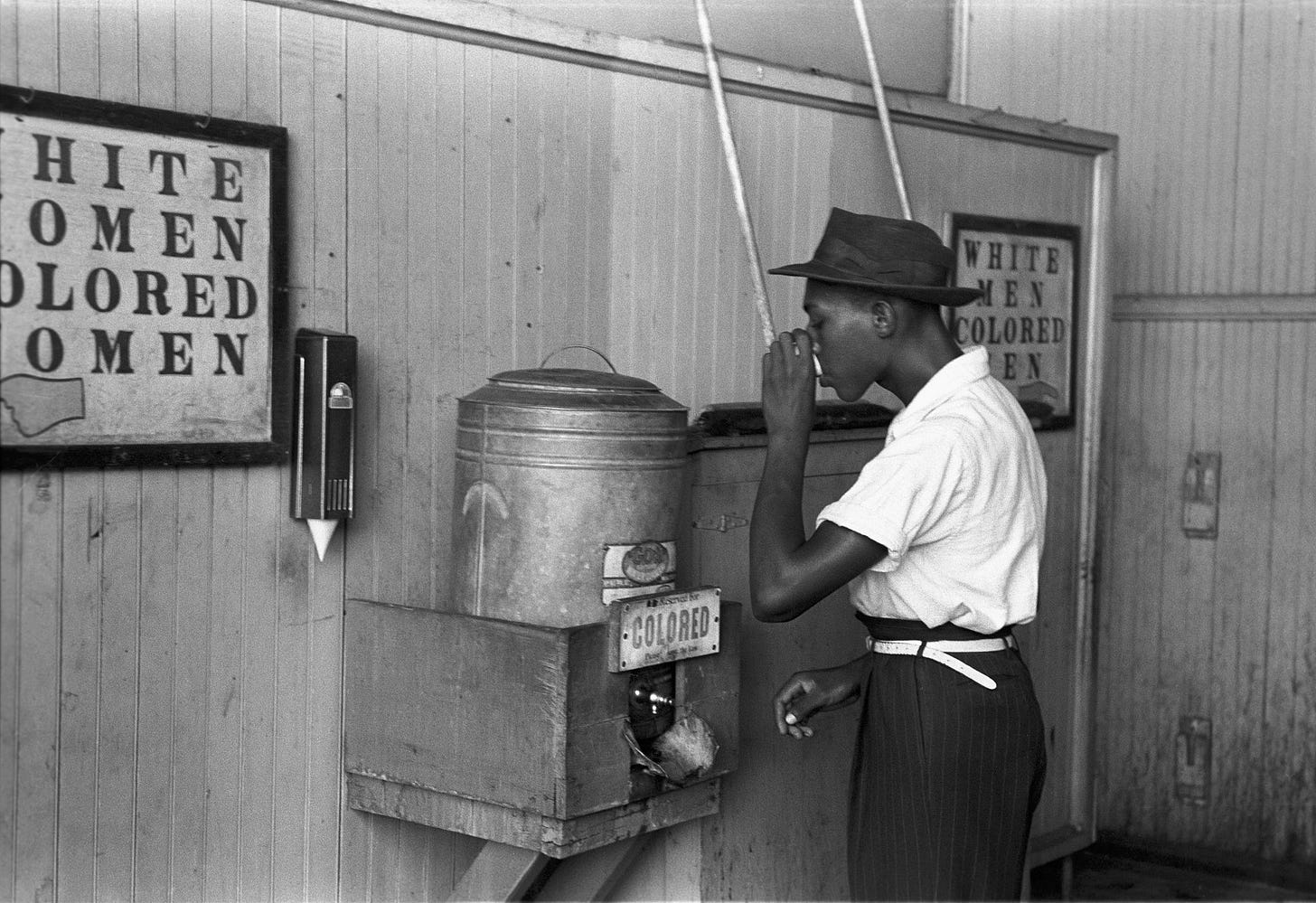America's dangerous nostalgia war
If we keep fighting for things we can’t have, then we can’t have nice things at all.
If there’s one cultural marker that spans Ronald Reagan’s presidency, it’s the television series Family Ties, which aired from 1982 to 1989. If you’re under 40, you may not remember it. Follow me here, because I think America is fighting not a culture war, but a generational war, against our own kids, who are searching for a nostalgia they can’t have.
Family Ties was supposed to be about a couple who used to be hippies in their youth adjusting to family life when their kids don’t hold to their liberal values. Actors Michael Gross and Meredith Baxter starred as the Steven and Elyse Keaton, and were supposed to be the focus of the conflicts and storylines. Then Michael J. Fox came and stole the show (literally), playing the iconic conservative-cool Alex P. Keaton.

Nearly 40 years after Family Ties premiered, real life has assumed the opposite dynamic for many families. Actually, we have at least three generations sharing America, and none of them want to give up an ounce of power to the others.
Today’s youngest generation, especially in white, progressive suburbia, is hooked on nostalgia for the time when liberal activists had enormous causes of liberty for which to fight.
In school, the generation raised in the 21st century learned about segregation, Jim Crow, racism, and the fight for racial justice. They were taught history about white colonizers and slavery. They looked at the world of their parents, who were raised on Alex P. Keaton, and see up close the hypocrisy, where country club churches and the pursuit of money crowned a smug assurance that America’s problems were all the fault of liberals who have created a government plantation and stunted the hard-won opportunities afforded by the civil rights struggle.
They look back and find Sen. Bernie Sanders, socialist. They look forward and find Rep. Alexandria Ocasio-Cortez, of the same cloth. This generation is in search of its own purpose, and nostalgia for the great fights of the 1960s and 70s—racial justice, environmentalism, wealth inequality, colonialism—is driving them.
Look at this graph over time, which illustrates the political divide between generations sharing the same America. (H/T Erick Erickson, who wrote about this.)
Between 1994 and 2017, on a scale of 1-10, Democrats moved 30% left, while Republicans moved 5% right. The influx of educated young college graduates filling the Very Online ranks of journalists, professionals, educators, historians, computer programmers, and political staffers has birthed a narrative looking for a fight.
The Alex P. Keaton generation, though many of them hold classically liberal positions on free speech, transparency, competent government, and equality of justice, struggle to understand the nostalgia for a Great Fight that the younger generation craves. Though there are wars, there are no Hitlers, so every political opponent becomes Hitler. Though there is injustice, corruption, racism, and bigotry, actual segregation, Jim Crow, and government-protected lynch mobs are things of the past. So every possible racial incident becomes a sign of returning to the days of segregation.
The 21st century liberal wants these culture wars, because without them they lack purpose, moral clarity, and societal goals. It’s easy to become depressed when your graduation gift from college is $100,000 in debt, little prospect of buying a home, and no path to a secure retirement.
As the young push left, as always, their reactionary parents push back. You can read story after story about college presidents, professors, private school teachers and staff being pushed to embrace radical leftist values, denounce themselves and their entire generation based on skin color. Banners like Critical Race Theory construct a non-falsifiable world where “oppressed” races can’t be bigots by definition, though they have deeply bigoted beliefs.
Disillusionment is a big factor in the Alex P. Keaton 80s generation. The Soviet Union was defeated, and now there’s a big nostalgia movement for all things Soviet in Russia. The young generation growing up in Russia know nothing about the crimes of the Soviet Union, all they know is Vladimir Putin. But the 1980s generation in America knows how we fought communism and won. Then we fought Saddam and al Queda. The fighting wars may be done, but did we really win?—in fact, we were lied to and we’re still being lied to by the same self-interested government that runs Washington no matter which party is in the White House.
The 80s kids who grew up with Reagan and Alex P. Keaton see communism as the enemy and therefore all their enemies are communists, or at least socialists.
The oldest generation, the ones who lived through the 1960s and 70s, let’s call them the Happy Days generation. The generation that fought and won World War II is dying off. Donald Trump promised Happy Days like the 50s, but failed to mention the racism, injustice and social restrictions that generation brought with it. The older generation was attracted to that nostalgic “Make America Great Again” song.
This nostalgia is dangerous, because each group is wanting something it can’t have without the other groups agreeing, and the things they want are not in opposition to each other, but in fact they carry a degree of cognitive dissonance—they want things they literally can’t have.
There’s no way to completely eliminate racism, even if all free speech is removed. There’s no way capitalism, free from all regulation, can supply the social and welfare needs of our society, which is why government provides certain services and creates regulations. There’s no way America can return to a time when other nations lined up at our throne after World War II. There’s no way a great conflict, like NATO versus the Soviet Union, can be placed into today’s global context. There’s no way America can return to a church-going, Christian nation while Christians fight over political power.
As I’ve matured, I realize that young liberals want things I want, but really they want to connect with a purpose larger than themselves. They’re being taught that purpose with near religious zeal, and crafting a narrative that makes anyone not with them, against them. Older liberals are nostalgic for a return to the fight for equality and justice, and yes, I want those things too.
Conservatives want a return to fiscal responsibility, moral clarity, wisdom, and character. We need to pick our battles, because we aren’t fighting the last conflict. We’re locked in a power struggle with our own children, as every other generation has done since the dawn of history.
Eventually, our kids will grow up and see their own kids take different positions, grasp on to different nostalgia, and wonder what their purpose is in our nation. Let me quote John Adams:
A boy of fifteen who is not a democrat is good for nothing, and he is no better who is a democrat at twenty.
Said another way, King Oscar II of Sweden was quoted in the Wall Street Journal in 1923:
A man who has not been a socialist before 25 has no heart. If he remains one after 25 he has no head.
Americans need to outgrow this war of nostalgia. If we don’t, we will forever be at war with ourselves, fighting battles that are long won, reclaiming defeats of out victories our grandparents saw.
If we keep fighting for things we can’t have, then we can’t have nice things at all.
If you haven’t subscribed to the Racket yet, click the button below to do so while it’s still free. And remember, with the Racket you get MORE than what you pay for!
You can also find The Racket News (@newsracket) on Twitter and Facebook. Join the discussion online with our Racketeers Facebook group.
Follow The Racketeers on Twitter: Jay, Steve, and David.
As always, we appreciate shares. If you see something here that you like, please send it to your friends and tell them that all the cool kids read the Racket!






So, I guess this isn't the post to be hawking my new synthwave album. ;-)
In all seriousness, it seems that for "America" to function well as a nation, we need a national project, adversary, or disaster to unite us. I think that you're entirely correct in pointing out that we have no Hitler-level figures to define ourselves in opposition to (not that we did that 100% at the time, either), so we manufacture our own. We have no frontier to settle, so we squabble at our personal borders. We don't have to beat the Soviets to the Moon, so we spend our time engineering financial instruments that generate dubious "value".
While a lot of Christians seem to think that the solution to that problem is for America get back on the Religion Train, I'm skeptical that's the answer, looking at the squabbling between religionists throughout history, which make the conflicts between Boomers and Millennials look like silly slap fights.
While I'm not a fan at all of the Chinese regime, recent news of them successfully sending rovers to Mars[1] and building their own space station[2] makes me hopeful that America will wake up and start to see them (as the Chinese sees us) as a rival power to take seriously, and we can unite (to a degree) in the project of working together to project American power and values into the next frontier, as an unquestionably superior alternative to Chinese values in space. I don't know if the future will play out that way, but as far as the "big picture" for the future that I subscribe to, that's the one I've chosen. And I've been very pleased as parts of America are waking up to that so that we don't only have the folks at NASA and DoD to depend upon to carry out that fight, but a nascent and innovative set of private players both in America (SpaceX, Astra) but among our allies as well (Rocket Lab, operating out of New Zealand).
Anyhoo - that's how I roll, and since adopting the new space race as the "big picture" that I'm focusing on, it's alleviated a decent amount of personal angsting and existential questioning, with a simple answer to the question of why not go purely nihilistic/hedonistic? And the answer is that there's so much interesting mind-blowing stuff we have yet to see (as a species), that giving up now is tantamount to abandoning the journey before it's barely begun.
[1] https://www.space.com/china-mars-rover-zhurong-lander-selfie-photos
[2] https://spacenews.com/astronauts-complete-first-chinese-space-station-spacewalk/
Completely agree Steve. Unhealthy nostalgia leads to irrational and unrealistic idealism, which when exploited explains our polarized political climate. I think like most people, we tend to be more idealistic when younger, filled with more zeal. Then when we start earning paychecks, paying the bills, and dealing with the real world as it is, our idealism becomes tempered with pragmatism. I've certainly become more "live and let live" as I've progressed from youth/undergraduate, to now being a middle aged person. Generally speaking, my core beliefs haven't changed, but the emotional investment in them has tapered off.